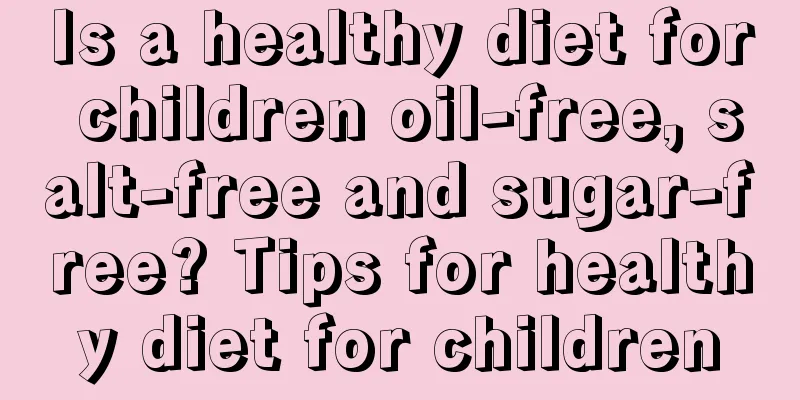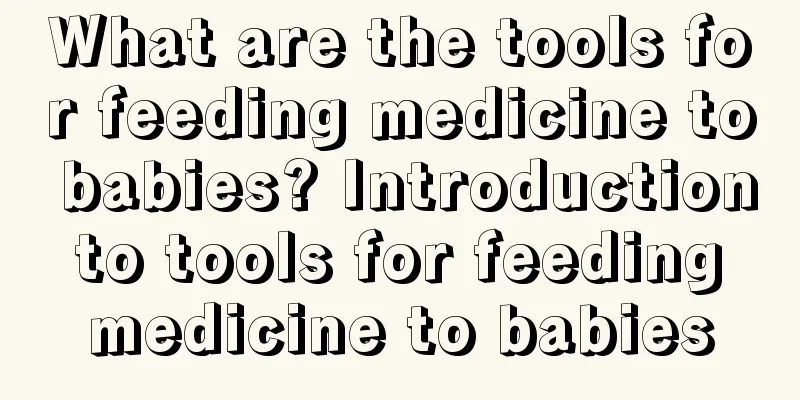Is a healthy diet for children oil-free, salt-free and sugar-free? Tips for healthy diet for children

|
In today's society, the improvement of living standards allows many children to eat whatever they want. However, in order to cultivate their children's healthy eating habits, parents give their children food with almost no oil, salt or sugar. Is this too extreme? So what is a healthy diet for children? Is a diet without oil, salt or sugar really healthy for children?"He can just drink milk, you can eat the fries, he can't eat them!" There was no outpatient clinic this morning, so the editor got up early and went out for a walk, and stopped by a fast food restaurant for breakfast. When I got the meal and found a seat to sit down, I happened to hear the conversation between three mothers at the table next to me. There was a child about six years old next to them, drinking milk quietly without making a sound. The reason why these conversations and scenes caught the editor's attention is mainly due to two things. The first is because the mother said: "I have strictly restricted the food of this child since he was a child. When cooking, I use less oil, less salt and less sugar, or even no oil, salt or sugar at all. And I don't let him eat snacks, candy, chocolate and other junk food." The mother was full of pride throughout the conversation. The second thing that caught the editor's attention was that the mother left her seat to go to the toilet about two minutes later. The child who had been sitting quietly beside her actually reached out to grab the French fries from the aunt's hand, and ate two bites of them at a time like crazy, finishing the whole bag of French fries in almost thirty seconds. During the process, the two aunts spoke but were completely unable to stop the child's behavior. I have seen the whole process, and now I want to talk to you about my thoughts on children's healthy diet. I agree with the healthy concept of less oil, less salt and less sugar in the diet, but completely no oil, no salt and no sugar is not very healthy. A healthy diet is a proper amount of oil, salt and sugarProper oil Although it is recommended to use low-oil cooking methods such as steaming, boiling, baking, and cold dressing, eating oily foods can allow us to ingest essential fatty acids that the human body cannot synthesize on its own. Among the six major food categories in the daily healthy diet standard, oils and nuts and seeds are one of them. Moreover, oily foods have a fragrant aroma and can increase appetite. It is okay to use cooking oil occasionally. There is really no need to be completely oil-free. What can be paid more attention to is that different types of oil are suitable for different cooking methods, and they should be carefully distinguished and selected. In addition to paying attention to avoiding excessive intake, it is also important not to fry at high temperatures for a long time, and the same pot of oil should not be used repeatedly too many times. As long as you can follow these conditions to cook food, adding a small amount of oil will increase your health. One more thing to mention is that if a child's normal diet lacks fat, it may cause constipation. Therefore, in addition to eating more vegetables and fruits, exercising more and drinking more water, doctors often tell parents to add more fat-rich foods to their children's diet to prevent the stool from being too dry and hard. Salt to taste A large amount of salt intake will cause water to be retained in the body, affecting the kidneys and increasing the burden on the heart, further causing dry mouth and increased blood pressure, which will affect health in the long run. Therefore, a healthy diet with less salt is correct. However, children's diets cannot be completely salt-free. In addition to the food not being tasty, it may also cause children to lose a channel for absorbing iodine, sodium, and chloride ions. Sodium ion deficiency will affect the normal functioning of nerves and muscles, and iodine ion deficiency will cause goiter. It is necessary to season children's food with a small amount of salt. Remind all parents not to feed children pickled food, nor to feed them delicately processed or heavily seasoned food, such as instant noodles or potato chips. Food eaten out is usually salty, so parents should try to cook it at home. Don't eat sugar Sugar is a source of sweetness in the diet. After entering the body, it can provide calories and make children feel full due to the increase in blood sugar. Providing candy before a meal will prevent children from eating other foods, resulting in unbalanced nutrition intake and may also cause tooth decay. Some studies have shown that sugar may also affect children's moods, so please let your children eat less sugar. Eat less chocolate and no snacks There have been studies that have shown that eating chocolate may cause children to be emotionally unstable or unable to sleep at night, and may also cause children to become obese. Chocolate on the market usually contains additional sugar, pigments, and spices, which may affect children's health. Although there is no evidence that eating chocolate will have a significant negative impact on children's health, it is still recommended not to feed children chocolate. As for snacks, the reason why children like to eat them is usually because of the strong taste of snacks. The rich aroma and taste make children eat one bite after another. However, these snacks usually contain too many artificial chemical ingredients and do not have much nutritional value. They may even cause children to skip meals. Please try not to eat them. When children are greedy, they can eat natural fruits, celery sticks, or carrot sticks instead. Parents can do this to help their children eat healthilyFinally, I would like to remind parents that when we try our best to give our children the best diet, please do not just prohibit them, but tell them from a young age why they are restricting what they can eat. After instilling the correct concept for a long time, children will naturally be able to control themselves, instead of eating as much as they want when their parents are not around. Another thing to remind is that before giving any food to other people's children, please ask the children's parents first, and also teach your own children not to eat food given by others unless their parents agree. When the child is about four to six months old, he or she will slowly accept solid food in the mouth, and parents can try to start feeding the child complementary food. During this period until one year old, the complementary food prepared for the child should be low in oil, but do not deliberately add salt and sugar; after one year old, the child can slowly eat the same food as adults, and these foods can be properly seasoned, with less oil, less salt and less sugar, and there is no need to insist on no oil, no salt and no sugar. After one year old, a small amount of fruit juice can be drunk, but eating fruit directly is better than drinking fruit juice. |
<<: Which brand of baby walker is good? At what age can a baby sit in a baby walker?
>>: What to do if your baby is picky about food? A complete solution for your baby's picky eating
Recommend
How long does it take to have another baby after a caesarean section? How long does it take to have a second baby after a caesarean section?
Many people have a cesarean section for their fir...
Why is painless childbirth difficult to popularize in China? Why is painless childbirth difficult to popularize in China?
Why is painless childbirth not popular? Today, le...
What are the signs of a baby's good development? Three feelings of pregnant mothers indicate fetal health
The fetus and the mother are "connected in s...
What is the experience of giving birth? How to eat to prevent aging after giving birth?
When it comes to giving birth, the first thing th...
How long is the best time for pregnant women to do yoga? Yoga moves that pregnant women can do
Pregnant women doing yoga is very beneficial to t...
Can the navel of a newborn baby be disinfected with iodine? It is best to dilute it
The navel of a newborn baby needs careful care. S...
What are the symptoms of infantile intestinal spasms? Signs of intellectual retardation in babies
Babies are too young and often cry when they feel...
Do wooden combs need to be washed frequently? What kind of wooden combs are good?
Wooden combs are very common in the market. Many ...
What should I do if my child has a high fever in summer? Can physical cooling be used to reduce the fever of babies in summer?
In summer, due to the hot weather, many babies ar...
Will I have stomach pain in early pregnancy? Causes of stomach pain in early pregnancy
Pregnant women are a very special group. They sho...
What are the benefits of doula delivery? How should the mother cooperate with the doula during delivery?
Pregnant women who are afraid of giving birth can...
What are the games that children can play to develop their intelligence? How to develop children's intelligence
What are the games that children can play to deve...
How to teach babies to talk
What new parents look forward to most is the firs...
How to train your baby to eat by himself blw independent eating method
When babies enter the stage of eating complementa...
How to identify the authenticity of Blue Moon laundry detergent? Is Blue Moon laundry detergent good to use?
Blue Moon laundry detergent is also quite common ...









